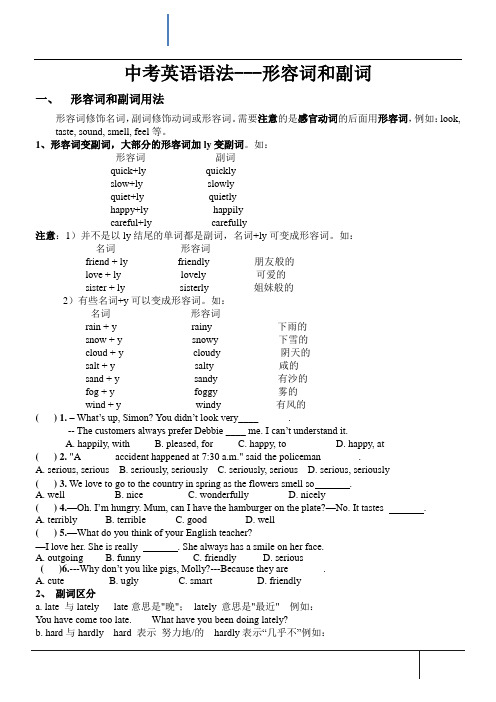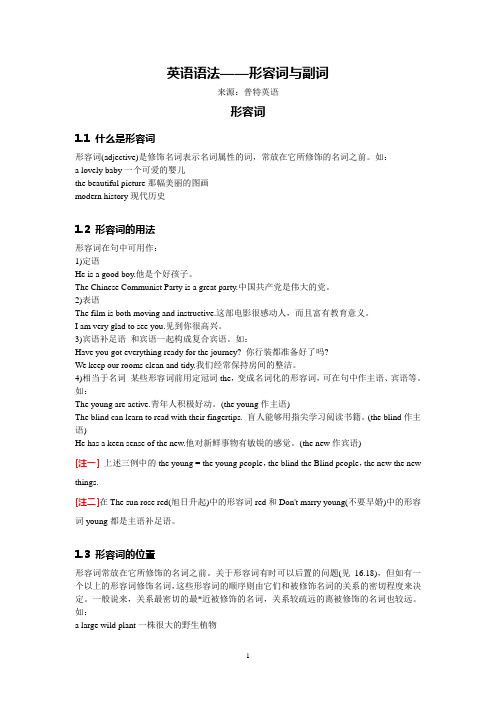英语语法之形容词副词
高中英语语法—形容词、副词

例题
1) Tony is going camping with ___ boys. A. little two other B. two little other C. two other little D. little other two
答案点拨:C 由"限定词--数词--描绘词--(大小,长短,形状,新 旧,颜色) --性质--名词"的公式可知数词,描绘词,性质依次顺序 只有C符合答案。
2、+ed
excite—excited worry—worried surprise—surprised close—closed interest—interested frighten—frightened
3、+ing
interest—interesting excite—exciting surprise—surprising follow—following
4、+y 所有表示天气状况的的形容词
sun—sunny snow—snowy wind—windy rain-rainy cloud—cloudy health—healthy
5、+ en
wool-woolen wood--wooden
6、+ern (东西南北)
east--eastern south-southern west--western north--northern
多个形容词做定语时的排列顺序:
在不确定的时候,可参照如下口诀: 美小圆旧黄,法国木书房 注释:美——描述性质;小——大小、长短、 高矮胖瘦 旧——新旧、年龄 圆——形状;黄——颜色;法国——产地、 国籍;木——材料;书房——用途 a new red silk cap一顶红色新丝帽 a short young Japanese businessman
中考英语语法---形容词和副词

中考英语语法---形容词和副词一、形容词和副词用法形容词修饰名词,副词修饰动词或形容词。
需要注意的是感官动词的后面用形容词,例如:look, taste, sound, smell, feel等。
1、形容词变副词,大部分的形容词加ly变副词。
如:形容词副词quick+ly quicklyslow+ly slowlyquiet+ly quietlyhappy+ly happilycareful+ly carefully注意:1)并不是以ly结尾的单词都是副词,名词+ly可变成形容词。
如:名词形容词friend + ly friendly 朋友般的love + ly lovely 可爱的sister + ly sisterly 姐妹般的2)有些名词+y可以变成形容词。
如:名词形容词rain + y rainy 下雨的snow + y snowy 下雪的cloud + y cloudy 阴天的salt + y salty 咸的sand + y sandy 有沙的fog + y foggy 雾的wind + y windy 有风的( ) 1.–What’s up, Simon? You didn’t look very____ .-- The customers always prefer Debbie ____ me. I can’t understand it.A. happily, withB. pleased, forC. happy, toD. happy, at( ) 2. "A ______ accident happened at 7:30 a.m." said the policeman _______.A. serious, seriousB. seriously, seriouslyC. seriously, seriousD. serious, seriously( ) 3. We love to go to the country in spring as the flowers smell so .A. wellB. niceC. wonderfullyD. nicely( ) 4.—Oh. I’m hungry. Mum, can I have the hamburger on the plate?—No. It tastes .A. terriblyB. terribleC. goodD. well( ) 5.—What do you think of your English teacher?—I love her. She is really . She always has a smile on her face.A. outgoingB. funnyC. friendlyD. serious( )6.---Why don’t you like pigs, Molly?---Because they are ______ .A. cuteB. uglyC. smartD. friendly2、副词区分a. late 与lately late意思是"晚";lately 意思是"最近" 例如:You have come too late. What have you been doing lately?b. hard与hardly hard 表示努力地/的hardly表示―几乎不‖例如:he works hard. I can hardly finish it in a week.c. close与closely close意思是"近";closely 意思是"仔细地" 例如:He is sitting close to me. Watch him closely.d. deep与deeply deep意思是"深"表示空间深度;deeply时常表示感情上的深度,"深深地" 例如:He pushed the stick deep into the mud. Even father was deeply moved by the movie.e. high与highly high表示空间高度;highly表示程度,相当于much 例如The plane was flying high. I think highly of your opinion.f. wide与widely wide表示空间宽度;widely意思是"广泛地","在许多地方" 例如:He opened the door wide. English is widely used in the world.( ) 1 Mingming got up very _______,so he came to school half an hour ______.te; latelyB. lately; lateC. lately; latelyD. late; late二、形容词与副词的原级、比较级和最高级1、形容词和副词有比较级和最高级的变化大多数形容词(性质形容词)和副词有比较级和最高级的变化,即原级、比较级和最高级,用来表示事物的等级差别。
初中英语语法之形容词,副词

初中英语语法之形容词&副词初中英语语法之形容词&副词形容词副词的原级、比较级和最高级1、分类:形容词和副词有原级、比较级和最高级三级。
2、规则变化:(1)单音节和部分双音节形容词和副词,在原级的后面加上er,est构成比较级和最高级。
a)直接加er,est :b)以重读闭音节结尾的,要双写最后一个辅音字母,后加er,est:c)以辅音字母+y结尾的,先把y改为i再加上er,est:(2)两个音节或两个以上的音节的,在原级前加more / most.3、不规则变化:原级比较级最高级good好的better更好的best最好的well好;(身体)好的,bad,badly糟糕的,糟糕地worse更糟糕的,更糟糕地;(身体)更不舒服的worst最糟糕的,最糟糕地;(身体)最不舒服的ill(身体)不舒服的many许多的(可数)more更多的;更most最多的;最much许多的(不可数);非常little少的less更少的least最少的far远的;远地farther更远的;更远地farthest最远的;最远地further进一步的(地)furthest最深刻的(地)4、形容词和副词的原级、比较级和最高级的用法:(1) 讲述某人/物自身的情况时,用原级。
基本句型是:主语(sb./sth) + 谓语动词+(very/too/so/quite/rather…) + 形容词/副词原级+….如:He is very oldnow. 他现在很老了。
They ran quitefast. 它们跑得相当快。
The weatherlooks rather bad. 天气看上去相当糟。
I am sohappy! 我是如此的快乐!☆表示两者之间没有差别时,使用句型:主语(第一个人物) + 谓语动词 + as + 形容词/副词原级 + as + 第二个人物+….如He is as excited as his younger sister. 他和他妹妹一样兴奋。
英语语法之形容词和副词

形容词和副词一、形容词和副词的作用1.形容词(adj.)修饰名词形容词(adj.)修饰名词时,有两种位置:1紧挨着被修饰的名词,做定语。
例:This is a wonderful world.(形容词wonderful修饰名词world)We are now living in a beautiful new house.(形容词beautiful和new修饰名词house)2置于系动词之后,做表语。
例:Their sleeping bags were warm and comfortable.(形容词warm和comfortable修饰名词sleeping bags)2.副词(adv.)修饰动词、句子、其他的形容词或副词例:Roy acted quickly.(副词quickly修饰动词act)Suddenly,one of the children kicked a ball.(副词suddenly修饰整个句子)It rained continually and it was often bitterly cold.(1.副词continually修饰动词rain;2.副词bitterly修饰形容词cold)The students from elite universities catch up very quickly.(1.副词quickly修饰动词catch up;2.副词very修饰另一个副词quickly)备注:一般情况下,形容词后加“ly”,就变成对应的副词。
例如:happy-happi ly、angry-angri ly、rude-rude ly。
例:生气的男孩生气地喊。
→The angry boy shouted angrily.二、形容词和副词的比较级形容词和副词的比较级分为:1)最高级(最...)2)比较级(更...)3)原级比较(一样...)1.形容词/副词的最高级:the+adj./adv.的最高级(+介词短语,表示比较的范围)“(...范围内)最...”,通常用于三者或以上的比较例:My younger sister is the tallest one in her class.(最高级变化形式:adj./adv.+est)The most serious problem of the project is the lack of power.(最高级变化形式:adj./adv.前加the most)注意:the+adj./adv.的最高级(+in+地点、场所)the+adj./adv.的最高级(+of+比较的对象)例:He is the tallest in our class.He is the tallest of all the students.练习:1)Which is the longest river____the world?2)This is the finest picture____them all.3)This stereo is the most expensive____all the ones in the shop.4)He is the best boxer____our town.答案:in;of;of;in2.形容词/副词的比较级:adj./adv.的比较级(+than+比较的对象)“(和...相比)更...”通常用于两者之间的比较例:I am taller than you.(比较级变化形式:adj./adv.+er)Air tickets are more expensive than train tickets.(比较级变化形式:adj./adv.前加more)Sometimes machines can perform better than human beings.(good比较级的不规则变化:better)注意:比较的对象要一致。
英语语法_形容词与副词(DOC)

英语语法——形容词与副词来源:普特英语形容词1.1 什么是形容词形容词(adjective)是修饰名词表示名词属性的词,常放在它所修饰的名词之前。
如:a lovely baby一个可爱的婴儿the beautiful picture那幅美丽的图画modern history现代历史1.2 形容词的用法形容词在句中可用作:1)定语He is a good boy.他是个好孩子。
The Chinese Communist Party is a great party.中国共产党是伟大的党。
2)表语The film is both moving and instructive.这部电影很感动人,而且富有教育意义。
I am very glad to see you.见到你很高兴。
3)宾语补足语和宾语一起构成复合宾语。
如:Have you got everything ready for the journey? 你行装都准备好了吗?We keep our rooms clean and tidy.我们经常保持房间的整洁。
4)相当于名词某些形容词前用定冠词the,变成名词化的形容词,可在句中作主语、宾语等。
如:The young are active.青年人积极好动。
(the young作主语)The blind can learn to read with their fingertips. 盲人能够用指尖学习阅读书籍。
(the blind作主语)He has a keen sense of the new.他对新鲜事物有敏锐的感觉。
(the new作宾语)[注一]上述三例中的the young = the young people,the blind the Blind people,the new the new things.[注二]在The sun rose red(旭日升起)中的形容词red和Don't marry young(不要早婚)中的形容词young都是主语补足语。
英语语法之形容词副词讲解

形容词和副词一、形容词1)、⑴作定语时放在名词的前面,且音节少的词放在音节多的词之前。
如:a big yellow wooden wheel(一个黄色的大木轮)⑴作表语时放在连系动词之后。
如:The price sounds reasonable.(这个价格听起来算是合理)⑴作宾语补足语时放在宾语之后。
如:We must try our best to keep our environment clean.(我们必须尽力保持我们的环境清洁)⑷后置的情况:⑴修饰复合不定代词时放在代词之后。
如:Something important 一些重要的事情⑴与表示“长、宽、高、重、老、远离”的词连用时形容词后置。
如:He’s 1.8 metres tall.(他身高1.8米。
)二、副词(1)作状语1.时间副词:一般放在句首或句尾,注意,early、late、before、later、yet等一般放在句尾,already、just一般放在动词的前面。
如:We will visit the Great Wall tomorrow.(我们明天要去参观长城) /2.地点副词:一般放在句尾,但here、there还可放在句首。
如:There you can see thousands of bikes running in all directions(方向).3.方式副词:一般放在行为动之后,suddenly可以放在句首、句尾或动词之前。
如:Old people can hardly walk as quickly as young people.(老年人几乎不可能走得和年轻人一样快) / Suddenly he saw a light in the dark cave(山洞).(突然,在黑黢黢的山洞里,他看见了一丝亮光)4.程度副词:修饰动词时,放在动词之前;修饰形容词或副词时,放在形容词或副词之前。
但注意,enough总是放在被修饰的形容词或动词的后面;only位置比较灵活,总是放在被修饰的词的前面。
高中英语语法形容词和副词
2. 几种变化形式: as much + 不可数名词 + as There is as much water in this bottle as in that one. as many +可数名词复数 + as
Bob has read as many books as Mary.
as + 形容词 + 不定冠词 + 可数名词单数 + as German is as difficult a language as Chinese. as + 形容词 + 不可数名词 + as Bread is as important food as rice.
4. 作状语
It’s raining heavily.
It’s a rather interesting job.
This is just what I said.
Eventually he arrived in Beijing.
注意:1. 有些副词有两种形式,一种与形容词同形,一 种以ly结尾,但它们的含义不同。 The station is quite near. He lives near.
后置定语: 少数以a开头的形容词(absent, alike, alive, available) 及 其他形容词(concerned, present) 作定语时后置。 He made full use of English reference books available and learned a lot. People concerned will attend the meeting.
“as+形容词+(a/an)+名词+as”表示同级比较,注 意中间的形容词和名词并列时各自所在的位置。 It is generally believed that teaching is as much an art as it is a science.
高中英语语法-形容词和副词
quick、fast与soon: quick往往指反应速度快, fast往往指运动速度快, soon则表示时间上很快即将发生: After a quick breakfast, he hurried to school. A train is much faster than a bus. His father will be back to China very soon.
Tony is going camping with ______ boys. A. little two other B. two little other C. two other little D. little other two
答案:C. 由\“限定词--数词--描绘
One day they crossed the ____bridge behind the palace. A. old Chinese stone B. Chinese old stone C. old stone Chinese D. Chinese stone old 答案A. 年龄+国家+材料。
(3) tall与high: Tall 指身高的高度,用于人和动物, 反义词为 short He is very short/tall. High 指物体的高度,另可形容价格,质量等, 反义词为low The kite is flying very high. Tall和high都可用来指tree, building, tower等, 但mountain只能用high形容。
1.Chinese, glass, a, beautiful, table a beautiful Chinese glass table 2.wonderful, my, garden, new, large my wonderful large new garden 3. a, round, table, small a small round table 4. a, old, dirty, brown shirt a dirty old brown shirt
高中英语语法之形容词和副词
高中英语语法之形容词和副词
【考点直击】
1. 形容词的用法;
2. 副词的用法;
3. 形容词和副词原级、比拟级、最高级的用法;
4. 形容词和副词在句中的区别和位置。
【名师点睛】
1. 形容词的用法
(1) 形容词在句中作定语, 表语, 宾语补足语。
例如:
Our country is a beautiful country. (作定语)
The fish went bad. (作表语)
We keep our classroom clean and tidy. (作宾语补足语)
(2) 形容词修饰something, anything, nothing, everything 等不定代词时,形容词放在名词后面。
I have something important to tell you.
Is there anything interesting in the film.
(3) 用 and 或 or 连接起来的两个形容词作定语时一般把它们放在被修饰的名词后面。
起进一步解释的作用。
Everybody, man and woman, old and young, should attend the meeting.
You can take any box away, big or small.
(4) the+形容词表示一类人或物
The rich should help the poor.。
小学英语语法——形容词与副词知识点讲解+练习
形容词和副词一、形容词、副词概述1、形容词定义:形容词(adjective),简称adj,用来修饰名词或代词,表示人或事物的性质、状态和特征。
2、副词定义:副词(adverb),简称adv,用来修饰动词、形容词或副词,表示时间、频率、范围、语气、程度等。
二、形容词、副词考点纵览三、综合练习( ) 1. How beautifully she sings! I have never heard _____ voice.A. a betterB. a bestC. the betterD. the best ( ) 2. She looks very _____ but I can’t remember her name.A. similarB. familiarC. friendlyD. strange ( ) 3. Children all looked _____ at the broken model plane and felt quite _____.A. sad; sadB. sadly; sadlyC. sad; sadlyD. sadly; sad( ) 4. The child dreamed that he had once lived in a _______ house in the forest.A. wooden pretty littleB. little pretty woodenC. pretty little woodenD. wooden little pretty( ) 5. ---Which team is _______ to win the game?---I don’t know, but I’ve found _______ for ours to win.A. probable; it unlikelyB. likely; it possibleC. possible; it possibleD. likely; it possibly( ) 6. With the development of the Internet, _______ communication is done by regular mail.A. lessB. moreC. littleD. few( ) 7. ---If you don’t like the red coat, take the blue one.---OK, but do you have ______ size in blue? This one’s a bit tight for me.A. a bigB. a biggerC. the bigD. the bigger( ) 8. If there were no examinations, we should have ______ at school.A. the happiest timeB. a more happier timeC. much happiest timeD. a much happier time( ) 9. This dress is prettier, but it costs ______ that one.A. twice more thanB. twice as much asC. as much twice asD. twice so much as( ) 10.________students are required to take part in the boat race.A. Ten strong young ChineseB. Ten Chinese strong youngC. Chinese ten young strongD. Young strong ten Chinese( ) 11. Allen had to call a taxi because the box was ____to carry all the way home.A. much too heavyB. too much heavyC. heavy too muchD. too heavy much( ) 12. Our neighbor has ________ours.A. as a big house asB. as big a house asC. the same big house asD. a house the same big as( ) 13. We were in ________when we left that we forgot the airline tickets.A. a rush so anxiousB. a such anxious rushC. so an anxious rushD. such an anxious rush( ) 14. ---I was riding along the street and all of a sudden, a car cut in and knocked me down.---You can never be ________careful in the street.A. muchB. veryC. soD. too( ) 15. ---You don’t look very ________.Are you ill?---No,I’m just a bit tired.A. goodB. wellC. strongD. healthy( ) 16. Four of Robert’s children were at the party,including ________, Luke.A. the eldestB. an oldest oneC. the oldD. an old one( ) 17. Many students signed up for the ________race in the sports meeting to be held next week.A. 800-metre-longB. 800-metres-longC. 800 metre lengthD. 800 metres length( ) 18. It’s always difficult being in a foreign country,________if you don’t speak the language.A. extremelyB. naturallyC. basicallyD. especially( ) 19. In recent years,travel companies have succeeded in selling us the idea that the further we go,__________.A. our holiday will be betterB. our holiday will be the betterC. the better our holiday will beD. the better will our holiday be( ) 20. When he heard a cry for help, he ran out as ________ as he could.A. hardlyB. quicklyC. finallyD. slowly( ) 21. “Our team is _____ to win the match.” “Really? But I don’t think so.”A. easyB. difficultC. possibleD. sure( ) 22. A ______ road goes ______ from one place to another.A. straight; straightB. straightly; straightlyC. straight; straightlyD. straightly; straight( ) 23. “This book is ______ more useful for us students.” “Yes, but it is _______ too difficult.”A. quite; quiteB. much; ratherC. rather; quite D quite; much( ) 24. There was a ______ change in the weather, and the rain came pouring down.A. quickB. slowC. fastD. sudden( ) 25. You can speak ______ in front of him, but you can’t eat ______ in his restaurant.A. freely; freelyB. free; freelyC. freely; freeD. free; free( ) 26. Tom will not be at the picnic, ______ to the family’s disappointment.A. muchB. moreC. too muchD. much more( ) 27. --- I have seen so little of Mike ______. Is he away on business?--- Oh, no. He just leaves for his office early and comes back very ______.A. later; latelyB. later; laterC. lately; lateD. late; lately( ) 28. From his ______ voice on the phone I know everything is well under way.A. satisfactoryB. satisfyingC. satisfiedD. satisfaction( ) 29. In ______ Chinese culture, marriage decisions were often made by parents for their children.A. traditionalB. historicC. peacefulD. civil( ) 30. The houses in the village are ______ built of wood and hay.A. mostB. almostC. nearlyD. mostly( ) 31. --- What do people wear when they go to the theatre?--- Well, it isn’t very ______. People can wear anything they like.A. normalB. certainC. modernD. simple( ) 32. Mary’s biology is ______ than ______ in the class.A. a lot of better; anyone else’sB. far better; anyone’s else’sC. much better; anyone elseD. a lot better; anyone else’s( ) 33. We decided not to climb the mountains because it was raining ____.A. badlyB. hardlyC. stronglyD. heavily( ) 34. Paris is one of _____ cities in the world.A. more beautifullyB. more beautifulC. the most beautifullyD. the most beautiful ( ) 35. Are you going to leave______?A. the open windowsB. the windows openingC. the windows openD. the windows opened( ) 36. Bob never does his homework _____ Mary, so he makes lots of mistakes.A. so careful asB. as carefully asC. carefully asD. as careful as.( ) 37. My sister is good at sports. She can jump ____ than me.A. highestB. very highC. too highD. much higher ( ) 38. When spring comes, the trees get ____.A. green and greenB. green and greenerC. greener and greenD. greener and greener( ) 39.He works very ___________.He _____________has a rest on Sundays.A. hard; hardlyB. hardly; hardC. hard; hardD. hardly; hardly( ) 40.He learns Russian_____________.A. goodB. niceC. wellD. fine( ) 41.The boy didn’t run______________ to catch the bus.A. fast enoughB. enough fastC. quick enoughD. enough quickly ( ) 42.Eating _____________ is bad for our health.A. much tooB. too muchC. too moreD. too many( ) 43.Have you ever seen ______________ big panda before?A. a suchB. such aC. so aD. as( ) 44.He looks very _____________ today.A. worriedB. worryC. worryingD. to worry( ) 45.Listen to me. I have _____________ to tell you.A. important somethingB. important anythingC. something importantD. anything important( ) 46. ---How ___ can you finish the drawing?--- In ten minutes.A. longB. often.C. soonD. rapid( ) 47. This book is _____ worth seeing again.A. veryB. quiteC. wellD. much( ) 48. My _____ brother is three years ____ than I .A. old; olderB. elder; olderC. older; elderD. old; elder( ) 49. We felt ___ after we watched the ___ football match.A. exciting; excitedB. excited; excitingC. excited; excitedD. exciting; exciting( ) 50. The old man lived ____ in the house, but he didn’t feel___.A. lonely; lonelyB. alone; lonelyC. alone; aloneD. lonely; alone小学英语语法——形容词与副词知识点讲解+练习参考答案1. A2.B3.D4.C5.B6.A7.B8.D9.B 10.A 11. A 12.B 13.D 14.D 15.B 16.A 17.A 18.D 19.C 20.B 21. D 22.A 23.B 24.D 25.C 26.A 27.C 28.C 29.A 30.D 31. B 32.D 33.D 34.D 35.C 36.B 37.D 38.D 39.A 40.C 41. A 42.B 43.B 44.A 45.C 46.C 47.C 48.B 49.B 50.B11。
- 1、下载文档前请自行甄别文档内容的完整性,平台不提供额外的编辑、内容补充、找答案等附加服务。
- 2、"仅部分预览"的文档,不可在线预览部分如存在完整性等问题,可反馈申请退款(可完整预览的文档不适用该条件!)。
- 3、如文档侵犯您的权益,请联系客服反馈,我们会尽快为您处理(人工客服工作时间:9:00-18:30)。
形副语法笔记本节课可以总结概括为非常7+2
1.简单过比较级最高级一般原则:直去双改more
2.特殊原则:(涉及常见词多多少少,好好坏坏老远)结合P44 1进行练习3.句型
1 比较级+than
2 最高级+范围
3 one of +最高级+名词复数
4 the +比较级,the +比较级越…就越… the more, the better.
5 as+原级+as 和…一样对比否定句型(not as/so 原级as)
6 比较级and 比较级越来越…注意强调多音节的情况more and more beautiful.
7 比较级than any other 名词单数同范围= 比较级than the other 名词复数同
范围
注意比较区分:比较级than any 名词单数异范围
XM is taller than any other student in his class. = XM is taller than the other students in his class.
对比:XM is taller than any student in his sister’s class.
倍数表达法
倍数as 原as The house is three times as big as ours.
倍数-1 比较级than The house is twice bigger than ours.
倍数the 名词of The house is three times the size of ours.
补充常见名词(length, width, height, size, weight)
可以修饰比较级的程度副词
两多两少两甚至,任何一个更远了(much a lot; a little a bit; rather even; any; far)more many 不可以修饰比较级。
